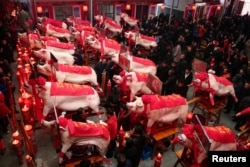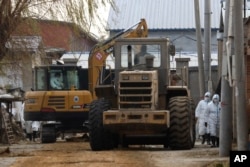The Year of the Pig is getting off to a rough start in China as the world's largest consumer of pork and home to half the world's pigs struggles to contain the spread of the African swine fever (ASF) virus.
Recent incidents, where traces of the virus were found in samples of frozen pork dumplings, suggest the outbreak is more widespread than has been reported, analysts said.
They add that the disease could have devastating socioeconomic consequences for both Chinese consumers and the global pig industry.
Latest outbreaks
Over the weekend, food safety regulators in southern Hunan and northwest Gansu provinces identified traces of the virus in pork products, including frozen dumplings.
The first outbreaks of African swine fever showed up in the northeastern province of Liaoning in August of last year.
Since then, China has reported more than 100 outbreaks from 25 of the country's 34 provincial-level administrative units, according to the Food and Agricultural Organization under the United Nations.
Of China's population of 430 million pigs, nearly one million have been culled because there's not yet a vaccine to prevent and halt the spread of the virus.
The losses have added pressure to local pig farmers, who are already be set with rising feed costs brought on by U.S.-China trade frictions.
Food scare
Chinese authorities have worked with food manufacturers to address the latest outbreaks, but it remains unclear if all contaminated frozen pork products have been located and destroyed.
Although the virus poses no risk to human health, people are likely to be one of the carriers of the disease and can spread the virus through contaminated water or waste food.
The disease is highly contagious among domestic and wild pigs and the virus is very difficult to eradicate. It can survive for an hour at boiling temperatures, days in the environment, weeks in meat or even months in frozen meat products.
It has taken some European countries more than a decade to eradicate the virus after it was first introduced to Georgia in 2007.
Under control?
Prior to recent outbreaks, Chinese authorities claimed the country's infection had been brought under control an assertion analysts find unlikely.
"This is not impossible, but unlikely given the enormously high density of domestic pigs in China over a geographical space larger than France, Germany, Belgium and the Netherlands combined," Dirk Pfeiffer, the chair professor of One Health from the City University of Hong Kong's college of veterinary medicine and life sciences, said in an email to VOA.
Another challenge is China's "high proportion of small to medium size pig farms with low biosecurity which don't have the financial means to invest into better facilities," he added.
The professor expressed concern over the possibility of under-reporting by Chinese farmers as they may not be provided an adequate level of compensation when pigs are culled.
China offers $179 (1,200 yuan) for each culled pig.
The dilemma lies in the balance, he said. If the compensation is too low, farmers are less likely to report. But too high, some may be incentivized to introduce the disease themselves and collect the fee.
Chinese officials have called on all stakeholders in the industry to cooperate with its efforts in stopping the virus' spread.
Although few of its neighbors, such as Hong Kong, Macau and Mongolia, import pork from China, the epidemic still puts many other Asian countries at high risk. Vietnam, in particular, is one of the 10 largest pork producers in the world and shares a border with China.
Cross-border transmission
On Tuesday,the Animal Health Department of Vietnam, confirmed the country's first outbreaks of the infection on three farms located in Hung Yen and Thai Binh provinces, southeast of the capital, Hanoi, claiming that all pigs had been culled.
Analysts said the epidemic will change the landscape of pig industries in China and globally.
"There will be a shift towards larger farms which can afford better facilities and that also means they are able to implement better biosecurity," professor Pfeiffer said.
The feeding of waste food to pigs will decline because the practice is a common mechanism for spreading this virus, he added.
Deng Jinping, an animal science professor at South China Agricultural University, said he's confident China has taken all necessary steps, including a ban on kitchen waste to pigs.
Enforcement, however, is always key for a sprawling country like China.
But the crisis, he added, will present opportunities for the country's massive pork industry to foster a better future.
"The butchery industry may be forced to seek a better development. Many would hope that the [long distance] transport of live pigs will be replaced by the use of refrigerated transportation. That will better manage risks for the third parties or across different regions. So, big changes to the industry can be expected," Deng said.






